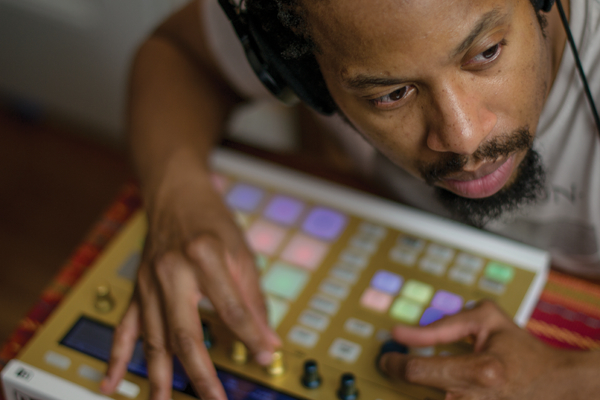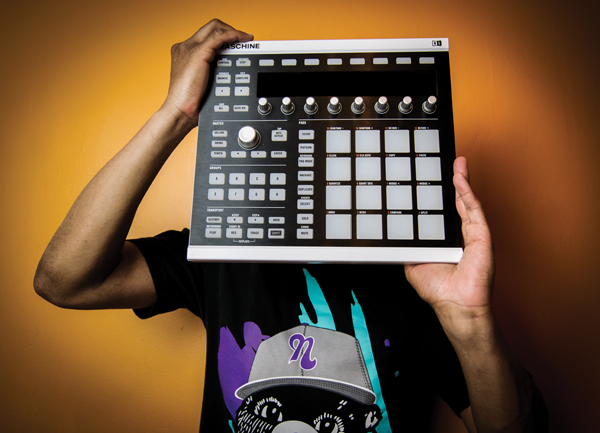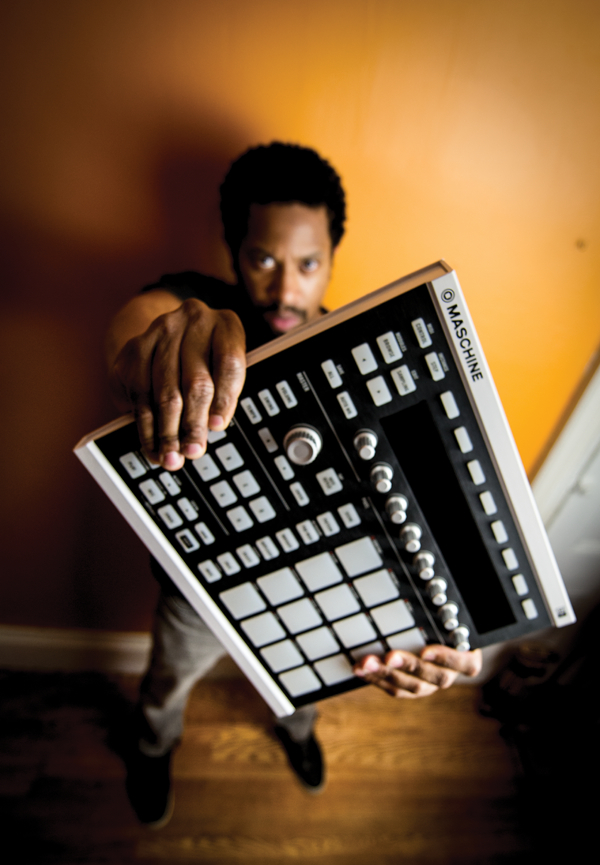Legendary MC Drops Critical Knowledge on Home Studio Production & Geeks Out on His Favorite Gear
Lif likes toys. He grew up watching the Creature Double Feature. His parents once drove all day to get him a replica of Godzilla. He still has it. The young Lif would wait excitedly each week for the records his dad used to bring home. New sounds sparked new ideas about the world, and new stories to get lost into.
Toys still inspire the unconventional MC (who still acts as one third of the Boston crew The Perceptionists when not doing solo work), and whether those shiny new playthings are talented friends’ beats, an excellent but affordable preamp, or new, customizable production gear (Lif owns two Maschines, the black and the white one, and many of the custom kits that they sell alongside those products), they are what get him creative.
It was ’95 when Lif picked up his first piece of production gear, the Ensoniq EPS-16+, which would prove to be a game changer for him. With this sampling keyboard, the MC churned out a number of tracks that were to become seminal to his career. To Lif, production has always been an essential part of the creative process.
“When I first started my career, my mantra was that any MC should be able to produce his or her own beats, so that you don’t run into that terrible time void of waiting for your schedule to line up with a producer, you know? And I feel like since I got away from that mantra in like, let’s say, the mid 2000s, it has been a key to my drop off in productivity.”
After joining record label Def Jux in 2000, Lif left his EPS-16+ behind and married himself to the MPC1000. “It’s crazy how a bad piece of gear can really mess you up. I just committed myself for 11 years to the MPC1000 and never enjoyed using it.”
After delivering the Mo’ Mega record in 2006, Lif left Def Jux. With an uninspiring MPC in tow, and without the structure of his label, he began to notice his productivity disintegrate significantly.
“It’s interesting. If you have equipment you want to play with, and that’s what you’re using to make music, you’re more likely to just make your music. I think that there’s so many phobias and little stupid things we go through as artists, sometimes you have to coax yourself, or trick yourself, into doing what you’re naturally born to do.”

When I met you, you were just coming off of a long period of time where you weren’t producing beats, and you weren’t attached to a label. You still aren’t attached to a label, but you are producing and writing up a storm. Can you talk about where all of this creativity came from?
I was living in the hills of Berkeley, California with the Balkan Brass Band that I had started making a record with. My re-introduction to production was really because they were pounding out different rhythms, most of which I could find my place in as a lyricist, but sometimes I just needed the drums to hit a little harder. That’s when I broke out the MPC again as a useful tool to just at least be like, “OK, let me layer the pre-existing drums with these drums so you guys can hear exactly what I need the pocket of this beat to be like.” From there my friend guided me toward Ableton. It didn’t 100% click with me, although I recognize it’s an amazing program.
Then, one day, I saw some offer online that Native Instruments was selling Maschine Mikro for $250, and I just thought to myself, “$250, why not? Just take a gamble!”I went and got Maschine Mikro and it exploded my mind. I felt like a lot of the sounds that they gave you, just in the default KOMPLETE Instruments package, were sounds that if I was gonna give someone a sample bundle, that’s what it would sound like. It was dark, epic, aggressive sounding stuff. It just immediately sparked my brain. From there I upgraded to the full version of Maschine.
It gives me all of the feelings that I had when I was working with the EPS-16+, but it gives me those drum patterns like on the MPC. I always felt the MPC was nice for drums, I just couldn’t do much else on it. I feel like Maschine is a great combination of those worlds. For anyone that was a passionate MPC user it’s a pretty easy transition, so it gives me that fluidity.
Plus, Maschine is just a controller. I hook it up by USB, and I can also have a mini keyboard that I can hook up via USB, so if I wanna get back to that feeling of actually playing with some keys like I was on my sampling keyboard, I can. It gives me a wider range of flexibility, and in turn it has brought me back to the origin of who I am as an artist, which is MC/Producer.
After getting comfortable with Maschine, you tapered off for a bit and found yourself really interested in gear. In recording gear. Do you think that was sparked by your interest in Maschine?
Returning to production could have had a hand in it, but really what it was, was some of my recording equipment drowned in a flood a few years ago, and it was the same stuff I recorded the I Heard It Today album on. I never really made much of an effort to restore my studio.
Akrobatik and I had started to record a new Perceptionists record, and I was trying to send him demos, because we were getting beats from Illmind. One day, I recorded something for him that sounded so bad I wasn’t sure that he’d be able to make it out, and he actually wasn’t even able to. That was the moment that I decided to put my foot down and make a commitment to being able to make world-class recordings out of my own personal studio.
What was some of the gear that you picked up?
The first piece of gear that, for me, was the most intense part of my search, is this preamp by BAE. It’s called the 1073 DMP. It’s basically a recreation of the Neve 1073 preamp. I asked so many people along the way. I did so much research, reading things in different forums, browsing online stores, and just reading and reading and reading. Then, finally, I went to Gianmaria Conti, the guy that does front-of-house sound for Thievery Corporation. He said that BAE makes the absolute best gear, and if you’re looking for that Neve sound, they are essentially the new Neve company, even though they have a different name. They’re using all the same components – or components made by the same companies that made the original Neve gear. It’s a very powerful preamp that, honestly, I have not mastered yet. I’ve gotten some amazing sounds out of it, and I’ve had times where I just can’t strike the right tone with it.
Other than that, another one of my favorite pieces of gear is my Focusrite. It’s called the ISA One. It’s a relatively inexpensive preamp. It just adds a certain…airiness to my vocals. I feel like if I was gonna be trying to cut a record that I wanted to get on the radio and I wasn’t doing something particularly gritty and grimy, I’d tend to turn to that one.
Then, when I was in Montreal, I picked up a third preamp. It’s called the Golden Age Project (GAP) Pre-73, and it’s really a knock off of the BAE, but it ‘s a very inexpensive knock off that I can travel with easily.
Right now, the Miktek CV4 microphone is my microphone of choice. It’s a large diaphragm tube condenser mic, and it just has a certain warmth to it. There are frequencies in my voice that I never want to hear because I’m very nasally when I deliver, and it can sometimes get a little piercing if I don’t have the right mic and preamp combination to warm it up.
I also got the Universal Audio Apollo, which I’m not even near mastering. That’s the piece of gear that will allow me to inevitably become more of an engineer. Sometimes it’s really tough to find the right engineer for a given project. It would be nice, especially for my self-produced stuff, to be able to run things through my own processors and not have to leave my studio to make my final sound.
How do these new pieces of gear capture your imagination?
The journey to get them was a huge part of it. There’s just like a relationship with each piece of gear. For instance, I started off trying a Neumann U 87 Ai microphone, which is the newest kind of U 87 mic. And the U 87 is thought to be an industry standard. Any quality studio you go to is gonna have that. But it’s also a $3,000 mic, so I borrowed it, kinda knew I wasn’t gonna buy it because of the price, and ended up taking it back.
I also had a Neumann TLM 103, which just didn’t capture my voice well. It brought out all those frequencies that I didn’t wanna hear. So that went back to the store, too. I’d heard so much about the Shure SM7B, which is the microphone that most famously is credited to the Thriller album. It’s a dynamic mic that can be found in most radio broadcasting studios. I borrowed that, and at the same time borrowed the Miktek CV4. Left the CV4 just sitting in the box for a long time.
I had actually just brought home an AKG C414 XLS, and wasn’t in love with it. So I brought that back to the store, too. I had never heard of the company Miktek, but I went home, opened up the box and immediately was like “Wow.” The first thing I recorded with it was actually for See-I, two guys from Thievery Corporation, Rootz and Zeebo. I recorded a verse using the Miktek and the Focusrite and fell in love with it immediately.
So you’re able to track more of your vocals at home.
Yeah. The productivity is through the roof, because on any given day I have so many things on the to-do list as far as recording, and now I don’t have to call someone and book studio time, I can just go to my own private lab and cut world-class vocals. They don’t sound their absolute best coming out of here, but when a good engineer gets their hands on ’em and does the things that would typically be done to vocals, they do shine.
And is that leading to more writing?
Absolutely. I can definitely say the other day I broke through a writer’s block on this track with El-P and Q*bert just because I wanted to use my gear. I came home from traveling, walked into this room, looked at my gear, liked what I saw, and just wanted to use it. A song that I hadn’t been able to write for over a month happened in about 45 minutes.
Now that I’ve upgraded my production equipment, I can dump my own beats into my own setup, get a rough mix on the balance and the levels that I want, sit here, and record vocals.
Do you feel that your creative process is different when your self-producing vs. when you’re working with a producer?
The only thing that feels different about it is that I’m making the beat. And I think that in making the beat, the listener is getting the full version of me. There’s just drum patterns in my head, and certain ways that sounds play with each other that I really only can create for myself.
I know that you have to write in many different places because you travel a lot, but can you paint me a picture of what it’s like when you’re in your most comfortable setting? What it’s like to write a record, or a verse?
After I’ve been in one place for a while, verses happen in whatever mode of transport I am on first – buses, trains are great for verses. I think I wrote a verse flying from Austria to Germany this fall. I think that traveling can give you at least that illusion of progress. You’re going somewhere and changing your situation, and there’s often a burst of energy from that. As there is a burst of energy from returning home.
When you’re home, what is it like to write?
At home I think that it’s more about discovering the beauty of a regiment, and understanding the power of stability. Over the summer, even though I was in and out of here a lot touring with Thievery Corporation, just having that ability to know that I’ve done enough writing for the day, and I can return to the song at some point the following day, and be able to come right into my studio.
How do you write, though?
Always to the beat.
What do you use, do you use a pen and paper?
No, usually just digitally. You know, virtual paper…
On your computer?
Umm no, no…I hesitate to say where I write…I write on my phone a lot.
Do you sit down?
I pace. I pace a lot of the time. Writing…it’s very active for me. I don’t know how much writing I do when I sit down. Actually, I think that if you looked at the ratios I’m probably walking around a lot more. Walking around, standing. I don’t know why, but it just doesn’t feel like a sedentary experience for me.
Do you ever see yourself going back to writing, like physically writing?
Yeah, I mean, sure! When it all comes crashing down, sure. You know, definitely. Pen and paper.
Like in that shitty TV show Revolution.
Or like in every prophecy in every blockbuster film that is out now. Where either aliens come and attack us, or the Earth is blowing up, or the power goes out. I think this deep-rooted sense that we all have – that the way we are living is not sustainable – I think we are correct. It’s beautiful ride, but when the phones won’t light up anymore, and when the studios don’t turn on, I will probably just be writing. I’ll be the village poet…doing shows and just popping up whenever I feel inspired.
Follow Mr. Lif on Twitter @therealMrLif


